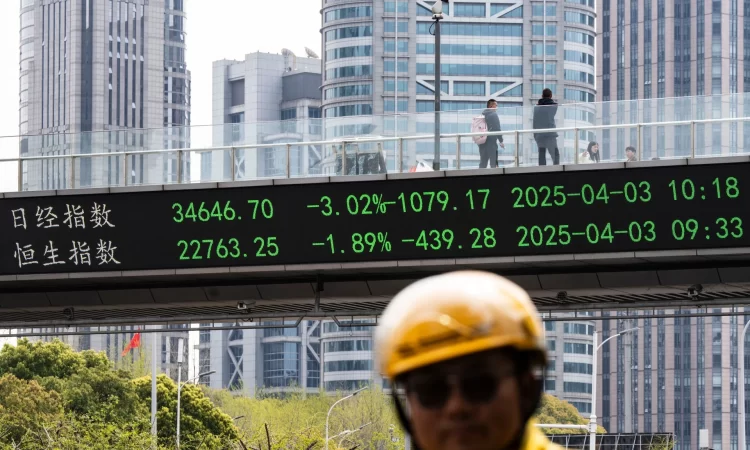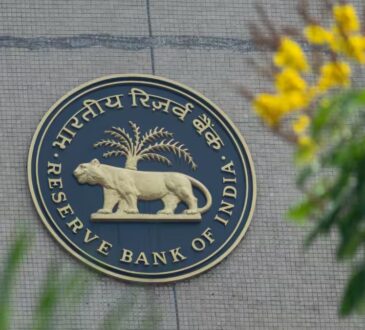
Hong Kong’s Hang Seng Index has climbed 31% in 2025 as Chinese equities benefited from the trade truce with the US in addition to optimism over the country’s growing heft in AI
[HONG KONG] The prospect of a revived trade war between Beijing and Washington threatens to undermine this year’s blistering rally in Chinese stocks and weigh on the yuan.
Global equities took a hit in US hours on Friday (Oct 10) after US President Donald Trump warned he would impose a “massive” increase of tariffs on Chinese goods. He later said that he would put an additional 100 per cent tariff on China from Nov 1, as well as place export controls on critical software. He spoke out after Beijing unveiled curbs on the export of rare earths earlier in the week.
While Chinese markets will get their first chance to respond on Monday, any following of the US sell-off may be tempered by weekend signals from the White House that it’s open to a deal and Trump declaring the US wanted to help, not hurt China.
Currencies, including the Australian dollar, edged higher in early trading on Monday and the offshore yuan inched 0.1 per cent higher against the US dollar to pare on Friday’s loss.
China’s equities and yuan may slide, though “I’d expect that pressure to be more modest than I would’ve done a few hours ago before the Trump” post on social media, said Michael Brown, a strategist at Pepperstone Group. “But some weakness is the expectation.”
A gauge of Chinese stocks listed in the US plunged more than 6 per cent on Friday in its biggest loss since trade tensions escalated in April. American equities also tumbled, with Nvidia, which is caught in the middle of the two nations’ export controls negotiations, sliding nearly 5 per cent. Emerging market (EM) currencies weakened.
BT in your inbox

Start and end each day with the latest news stories and analyses delivered straight to your inbox.
“China’s markets will likely open under pressure on Monday,” said Haris Khurshid, chief investment officer at Chicago-based Karobaar Capital. “The tariff headline and new tech restrictions will spook sentiment right out of the gate.”
A lasting deterioration of ties between the two largest economies could imperil one of the world’s best performing stock markets this year, as well as renew doubt over China’s investability.
Hong Kong’s Hang Seng Index has climbed 31 per cent in 2025 as Chinese equities benefited from the trade truce with the US in addition to optimism over the country’s growing heft in artificial intelligence (AI). Alibaba Group Holding has surged more than 100 per cent, with Tencent Holdings up almost 60 per cent. The rally comes after the Hang Seng fell for four straight years to 2023.
Any sustained weakness in the yuan is typically negative for Asian currencies because the yuan has long been seen as an anchor for the region. Emerging-Asian currencies have underperformed most of their EM peers this year, with the Bloomberg Asia Dollar index up just 2.6 per cent against the US dollar. A broader index of EM currencies has climbed 6.4 per cent, on track for its best year since 2017.
Chinese government bonds, however, stand to benefit. On Saturday, the 30-year yield dropped five basis points in thin volumes, the most since April, according to official data. The 30-year yield reached the highest in almost a year earlier this month amid a stronger risk appetite.
Whether the truce holds or collapses remains unknown. Trump acknowledged on Friday that he could retreat from the tariff escalation if Beijing backed down from its plan to limit rare earth exports. Trump and Chinese President Xi Jinping are due to meet later this month, a meeting Trump threatened to cancel but later said was still possible.
The uncertainty may limit the impact on Chinese equities, according to Hao Zhou, chief economist at Guotai Junan Hong Kong.
“I expect China’s markets to fall initially and then rebound with caution,” he said. “There are a lot of questions left unanswered.”
The main focus of negotiations between Beijing and Washington centres around export controls. The US is limiting shipments of semiconductors and AI chips needed by China, while China is curbing exports of critical materials and magnets wanted by the US.
On Sunday, China said that the US should stop threatening it with higher tariffs and urged more negotiations to agree on a trade deal. China’s recent trade countermeasures on US-related issues were necessary defensive actions, the Ministry of Commerce said. Beijing on Thursday said that overseas exporters of items that use even traces of certain rare earths sourced from China will now need an export license, citing national security grounds.
Untenable situation
The increased tensions can be seen as part of negotiating strategies before the meeting between Trump and Xi, according to Hao Hong, chief investment officer at Lotus Asset Management in Hong Kong. Trump has previously said that he will meet Xi at a summit in South Korea this month.
“As this is clearly an untenable situation only weeks from the leaders’ summit, both sides could be seen as ‘all in’ on the upcoming negotiation and working their way down from this point,” Hong said. For the stock market, the trade escalation “will dent the rally but is unlikely to change its upward trajectory”, he said.
Also on investors’ minds will be a closed-door meeting convened by the Chinese Communist Party from Oct 20 to 23 to review development plans for the next five years.
In the currency market, traders will be watching to see if China’s central bank sends any signals when it sets the yuan’s daily reference rate on Monday. The so-called fixing limits the onshore currency’s moves by 2 per cent on either side. The yuan, which has gained some 2 per cent against the greenback this year, closed at 7.136 per US dollar on Friday.
Regardless of the risks posed by tougher talk between Beijing and Washington, Chinese equities were already looking overheated, said Barry Wang, co-portfolio manager of the China Opportunities Fund at Oberweis Asset Management. The MSCI China Index of stocks capped its fifth month of gains in September, its longest winning streak since 2018.
“The China rally this year has run too far,” Wang said. “It might take a pause for fundamentals to catch up.” BLOOMBERG






